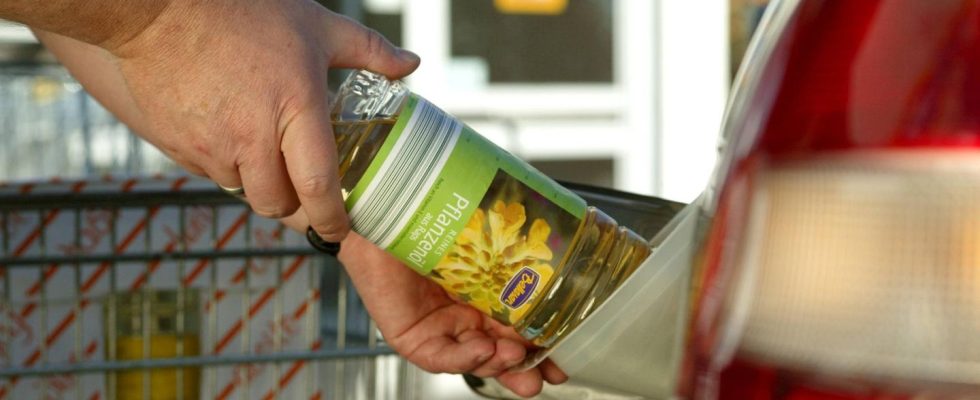questions and answers
Fill up with cooking oil? What the new biodiesel is all about
Bio-diesel: Drivers will soon be able to fill up with fuel made from old cooking oil.
© IMAGO / JOKER
Climate-friendly diesel from used cooking oils and waste? This will soon be completely normal at German gas stations.
The federal government has cleared the way for petroleum-free biodiesel in car tanks after a long standoff – on Friday it will be the Federal Council’s turn. If the federal states also agree, diesel vehicles could become climate-friendly from mid-April Fill up with fuel from waste materials.
Bio-diesel: what is HVO100?
At the moment, the law in Germany only allows biofuel admixtures of seven percent in diesel. According to the Association of the German Biofuel Industry (VDB), this B7 is the common type of diesel at German gas stations. In the future, they should also be able to sell 100 percent biodiesel made from certified, sustainable residues and waste materials. These are mostly old fats from commercial kitchens, but also leftover wood, cellulose waste or fish leftovers. The abbreviation HVO stands for Hydrotreated Vegetable Oils: vegetable oils treated with hydrogen.
What does HVO bring to the climate?
According to the Federal Motor Transport Authority, there are more than 14 million cars, trucks and other vehicles with diesel engines on the road in Germany today. Federal Transport Minister Volker Wissing (FDP) said: “With HVO100 we can reduce CO2 emissions in transport in the short term.” The savings are up to 95 percent compared to conventional diesel.
Mercedes 300d Cabriolet
This luxury convertible from the Adenauer era is now worth one million euros
How big is the economic importance of HVO100?
As the Federal Association of Independent Gas Stations (BfT) announced, biodiesel is now used exclusively in local public transport, by logistics operators and in agriculture; It is not yet freely available at gas stations. But the potential in the freight forwarding and logistics industry is great: “We estimate that 80 percent of HVO use will be commercial.” According to VDB, global HVO production is expected to exceed 30 million tons by 2025. Finnish HVO manufacturer Neste expects that biogenic fuels can replace around a billion tonnes of crude oil by 2040, accounting for around 40 percent of global transport demand.
Is biodiesel more expensive than diesel made from petroleum?
Yes, because the production costs are higher. According to experiences in other European countries where HVO has long been refueled, it is 15 to 20 cents per liter more expensive than fossil diesel, as the BfT announced. The Federal Association of Medium-Sized Energy Companies (Uniti), which organizes 40 percent of street filling stations, expects “that HVO100 will be particularly interesting for fleet operators in the first start-up phase”: This will make it easier for them to achieve CO2 targets even with existing vehicles. If HVO-100 diesel were to have an energy tax exemption compared to fossil diesel, it would further help the economy and the climate.
Does HVO100 damage the engine?
“Modern diesel engines are generally suitable for this,” said Wissing. “There is no need for any technical adjustments or conversions to the vehicles or the nationwide filling station network,” says a statement from ADAC, Uniti, the automotive industry, logistics associations and some truck manufacturers. However, the ADAC points out that the approval of fuel for an engine is generally the responsibility of the vehicle manufacturer. “Such approvals are currently only available for a few models from the brands Audi, BMW, Citroën/Peugeot/Opel, Nissan, Renault/Dacia, Seat/Cupra, Škoda, Toyota, Volvo and VW.” There is an “urgent need for further comprehensive manufacturer approvals for existing car models” so that HVO100 is accepted by consumers.
When will HVO100 be available at gas stations in Germany?
The new fuel will not be available at every gas station, “but will gradually be offered across the board,” said the ADAC.
Uniti announced that the small and medium-sized gas station sector “is in the starting blocks”: If the Federal Council approves on Friday, HVO100 could go on sale to the public on April 13th. Biogenic HVO diesel and green electricity-based synthetic e-diesel are labeled “XtL” at gas stations. “We do not assume that the introduction of HVO100 will result in the loss of other offerings.”
Karlman King
The most expensive SUV in the world – this Batman mobile costs two million euros
On the other hand, the BfT said: “HVO will have to be refueled at a few petrol stations when it comes onto the market – for reasons of space and because a technical change will also have to take place.” The BfT would welcome it if E5 petrol no longer had to be kept in stock at petrol stations: “This would free up space for HVO.”
What are other countries doing?
According to the Federal Ministry of Transport, you can already fill up with biofuel in the Netherlands, Sweden, Lithuania and many other countries. According to Uniti, HVO100 is already freely available at over 600 gas stations in Europe. Sales are permitted in most EU countries and the USA. Since strict CO2 requirements increasingly apply to tenders for international logistics contracts, the ban in Germany was a competitive disadvantage for German providers.

